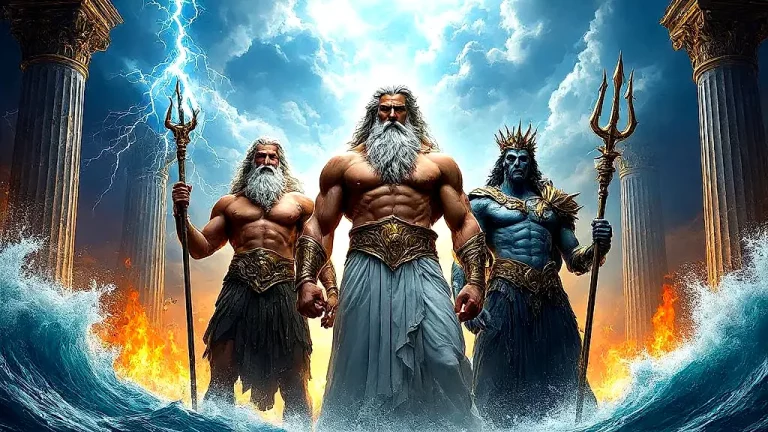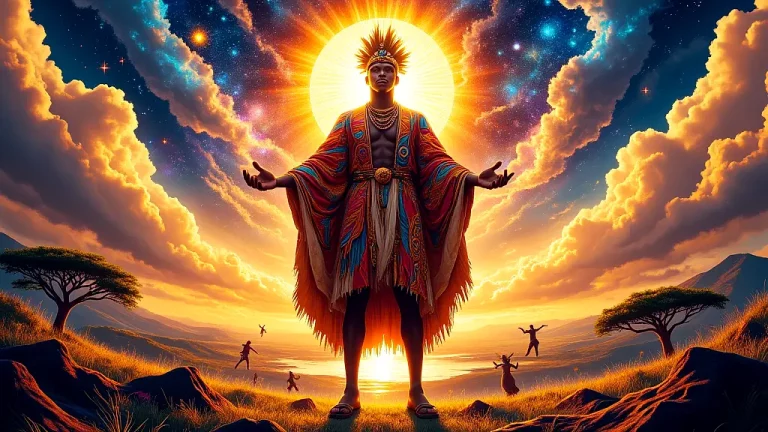Penthus: Spirit Of Grief And Lamentation In Greek Mythology
Interestingly, in Greek stories, where many gods, goddesses, and spirits have important stories, Penthus as the spirit of grief and deep sadness, provides a look into how old cultures handled mourning. These stories often have different versions and so does Penthus, being shown in many tales with little details that stand out in each one.
Key Points:
- Penthus means grief and mourning in Greek myths.
- Not found in major myths, linked to feelings.
- Connects with Nyx, night goddess, adding mystery.
- Seen in cultural rituals and mourning traditions.
- Penthus is there in hero stories, like Achilles.
- Art and writings show grief with Penthus in mind.
- Modern art and psychology still talk about Penthus.
Penthus stands for the human feeling of sadness, giving a way to see how people used to notice and talk about grief in ancient Greece. This type of sadness Penthus represents is much like the black cloth used in mourning today.
Someone learning about Penthus’s role, can think about how ancient folks understood and made rituals for their feelings, which means a lot even now. As we learn more about Penthus’s life and what he meant, we find stories, symbols, and cultural parts pulling together, all highlighting how grief sticks with human minds.
Who is Penthus?
Firstly, to fully get Penthus, we need to look at his background and cultural importance in Greek stories. While considering Penthus, one should cover where Penthus originally came from and what he stands for symbolically. Remarkably, this provides a better picture of his relevance.
Where Penthus Comes From
In Greek stories, Penthus is thought of as a spirit, a daimon showing deep human feelings of grief and sadness. He isn’t seen much in major myths. Yet, he appears with other spirits that also stand for different mind states, showing his unique place. Though stories about Penthus change often, this means there is a natural uncertainty in Greek tales. At times, he is linked to Nyx’s family, the night goddess, which means he has a mysterious and shadowy presence. In ancient Greece, spirits like Penthus were seen not as singular beings but as expressions of life’s big feelings. Penthus in this sense can be compared to other symbols of sadness known to us, like figures we see crying in Western art and stories. This connects to their stories where gods and humans face being sad and losing things. Important ideas cover:

- Origins: Sometimes thought to be linked with divine like Nyx, underlining his mysterious side.
- Role in Mythology: Means the shared experience of being sad, fitting with other thoughtful spirits.
- Cultural Reception: Known more for standing for sadness than having detailed myth stories.
Penthus, a spirit symbolizing grief in Greek stories, is mainly known for representing deep emotions rather than having prominent roles in myths.
What Penthus Stands For
In Greek stories, Penthus is a clear sign of deep feelings linked with loss and sadness. Unlike gods like Apollo or Zeus who have lots of stories and clear shapes in those tales, Penthus is about the hard-to-understand nature of feeling sadness. This means old cultures tried to express their feelings about grief. Remarkably, he means that everyone agreed mourning was a part of life, both personal and shared.
Similar to how people now dress in black to mean sadness, Penthus showed how ancient people saw sad times as a part of life. A lot of the time, his feeling is found in stories about losing things, telling us that mourning was a part of social and spiritual life.
When looking at how people thought of Penthus, it’s clear he was more than just a figure in stories. He was important in making sense of sadness. The ancient Greeks saw grief as both a personal feeling and shared event, pointing out how important rituals were. In some stories, his being there means big feelings were recognized in many parts of life. Key ideas that Penthus stands for are:
- Grief Embodiment: Penthus is the spirit of great sadness and mourning.
- Cultural Rituals: He means a big part of ceremonies that focus on loss and group mourning.
- Psychological Acknowledgment: He stands for understanding grief as a key part of being human.
These ideas point out Penthus’s role as a constant part of how ancient Greeks managed emotions, mixing together stories and meanings that still live on in today’s views.
Mythological Stories Surrounding Penthus
To get how Penthus matters in stories, let’s look at mythical tales where he really changes the path of Greek heroes and impacts big happenings like the Trojan War. In many tales, his effects are seen, and they mean a lot.
Penthus in Greek Tales and Heroes
In the wide world of Greek stories, Penthus is not the main character, yet his presence is an important part of the feelings heroes go through. He doesn’t appear as a direct character. Instead, Penthus is about the feelings heroes like Achilles and Heracles have on their journeys.
Take, for example, Achilles’ story when he mourns for his friend Patroclus – Penthus means you can feel the deep sadness there, adding to the tough emotional events these heroes face. This means there are ongoing sides of sorrow and grief shown through those thought to be powerful, creating a universal human experience.

It’s a bit like how in movies and books today, characters have strong emotions that make their stories deeper, pointing out how lasting these themes are.
How Penthus fits into these stories points out how the Greeks thought about emotional balance. By bringing in the spirit of grief, these tales mean that dealing with feelings and emotions was important for personal and group life. In stories where heroes jump deep into sadness, Penthus is there, quietly watching and helping make them think and change, forcing heroes to see their human sides. This means they understood catharsis – letting out feelings through art was more than just fun; it was a way to work through tough emotions. Important ideas here are:
- Emotional Depth: Points out how complex hero feelings are, showing where Penthus fits.
- Hero’s Vulnerability: Even the strongest face grief, meaning it’s widespread.
- Catalyst for Catharsis: Shows how Penthus makes room for feeling release and personal growth.
These ideas reinforce Penthus’s presence in hero stories and ancient Greek culture, shaping their journey and the big picture of ancient life.
The Trojans and Penthus
In the troubled times of the Trojan War, the wide sadness Penthus stands for appeared clearly with both fighters and everyday people involved in what happens after conflicts. In stories about the war, like Homer’s Iliad, his emotional and spiritual presence appears a lot in times of big losses, for instance when Troy falls, filling the city with despair and affecting everyone.
The Trojans’ rituals of saying goodbye to warriors like Hector mean collective mourning, which Penthus stands for. This is like how societies remember tragedies together, using shared sadness to heal a group.
Such stories capture the vast wave of sadness Troy felt, making clear not only the physical fights but also the emotional battles, and meaning Penthus has a critical part in these ancient stories.

The Role of Penthus in Ancient Greek Culture
In myths and daily life, you can see Penthus’s clear impact on ancient Greek culture, especially in how people showed grief and mourning. There is a clear impact he had that appears in the stories and customs.
Traditions and Ceremonies
Grief in ancient Greece was not just private; it was a shared event full of ritual meaning, often calling upon Penthus to bring out these together feelings. The Greeks had complex ways of doing funeral rituals and customs for grieving, combining performance with poetry to fully show sorrow and honor the dead.
An important stage, the prothesís, was when the body of the dead was placed at home, surrounded by people who wept and made offerings. Besides being a way to honor, these acts became a shared acceptance of loss, inviting everyone to unite in sadness and outlining Penthus’s influence.
For anyone watching now, these rituals might appear similar to public memorials or group vigils, where private sadness becomes part of a community experience, offering comfort through shared recognition of loss. Also, apart from each funeral, there were big festivals and public events like the Anthesteria festival, joining people with spirits in a group setting.
During Anthesteria, it was thought that spirits returned to visit the living, and detailed rituals made sure they were treated with respect. These celebrations emphasized respect for grief as part of life’s cycle, weaving Penthus into the structured fabric of belief and customs.
By joining these events, Greeks would accept their sadness and make it part of a shared memory and cultural past. These practices, in their richly detailed and community-focused ways, mean Penthus was not just an idea in myths; it was also a real part of daily life, showing the ancient way of seeing grief as a vital section of being human and spiritual.
Greek Writings on Mourning
Mourning is clearly part of Greek literature, meaning deep feelings about loss resonate with people over time. In stories like Homer’s Iliad, you see how characters like Achilles feel grief strongly, indicating a timeless need to feel loss and find comfort. Mourning in these works appears as both a personal journey and collective experience; grieving seemed essential to being human.

The words of the characters make Penthus’s spirit appear, meaning these ideas are deep within epic stories. Greek plays like Euripides’ Alcestis and Sophocles’ Antigone make these ideas bigger, as characters deal with sorrow and duty, showing how society thought of grief, giving views about personal and group reactions to death.
Moreover, the poetry of Sappho and Simonides paints a picture of sadness through softer words, linking individual pain with common ideas. Sappho’s intimate lines show private feelings, while Simonides’ words for dead soldiers call forth a national spirit of heroism and shared mourning. This writing shows how Greek culture understood loss well. Even today, modern books and movies look at loss and healing, hinting at the similar roots of human mourning across ages. Key works include:
- Iliad by Homer: Personal grief and Achilles’ anger.
- Antigone by Sophocles: Family duty and society’s grief.
- Poems by Sappho: Private sadness.
- Writings by Simonides: National expressions of mourning and bravery.
Through these ancient stories, people had a place to think about the mix of feelings over loss, making Penthus part of the fabric of Greek emotions and culture.
Greek literature deeply explores mourning and grief, highlighting personal and societal reactions to loss through emotional stories and poetry that connect private pain with shared cultural experiences, demonstrating a timeless human need to find comfort.
How Art Shows Penthus
In ancient Greece, art known for its detailed picture of gods and human life also talked about the idea of grief through Penthus. You can find Penthus in different art – though not as often as big gods – by seeing sorrow in pictures.
Sculptures and pottery mean scenes of mourning, where you see Penthus through serious looks and feelings in the art, like on burial urns or stone markers where crying figures seem to mourn those who died. Moreover, these old art pieces can mean modern symbols in memorial art, like bending flowers or crying angels that mean loss and sadness.
But in those times, artists had ways to show how heavy mourning felt, reflecting Penthus’s quiet but serious effect on Greek culture. Textures, body positions, and face shapes together capture a moment of grief, giving a picture of how the ancients saw their idea of sadness, letting us see their serious thoughts about death.
Comparative Mythology: Similar Figures
Grief is widespread in cultures, leading to a look at mythical figures that mean sadness and mourning. Importantly, we see how these figures appear differently across various traditions.
Similar Figures in Other Cultures
Roman myths talk about Nemesea, the goddess of anger and fairness. She mixes with grief themes, watching over human sadness like Penthus does. Though not grief itself, her link to human feelings and what people do wrong means her role in sadness and justice moments. You can sense Nemesea in justice rituals and customs mourning misdeeds, much like Penthus. Standing out is Nephthys in Egyptian myths.

Mostly a guardian god, during burial times, she is often with Isis in making mummies. This means looking after the dead and mourning, a part of the Egyptian view that mourning leads to new life, much like today’s idea that grieving helps heal. In Norse stories, we meet Hel, who leads the underworld named after her.
Penthus means being sad, but Hel is where those with a bad end go. Yet, her rule over the dead ties her to sadness and the end, like Penthus. Hel’s world stresses the cold fact of dying and going to the next place. Her role matches Penthus in accepting and living with grief.
These various mythical figures mean humans face loss, showing how different cultures see sadness through symbols.
Evolution of Penthus through History
Looking at similar mythical characters highlights the lasting nature of grief, which makes us explore specifically how Penthus through time was seen and pictured in different eras of history.
Penthus Over the Years
Penthus, over the centuries, the idea has changed again and again because of different cultures and historical surroundings, clearly showing how myths are flexible. In old Greece, Penthus was less important compared to major gods, but he matched the shared human feelings of sadness and hopelessness.
As time moved from ancient to medieval, Penthus’s role mixed a bit with other figures connected to mourning when new cultural stories came up. Like when grim reapers’ images changed with society’s thoughts on death, the character of grief also adapted to changing society, showing the changes in how people saw mourning.
The Renaissance brought back Greek stories and with them fresh views of figures like Penthus, giving them more humanity and thoughtfulness as creatives pondered over the commonality of feelings. His roles kept shifting, responding to every time period’s cultural, religious, and philosophical ideas, similar to how today’s cultural symbols are constantly seen in new ways.
Penthus in Today’s World
Today, Penthus is an important point when talking about grief and group sadness, heard in both the mind and culture. Though old Greek myths might not be as commonly taught or known fully, the example of Penthus fits with today’s thoughts on emotional health and sharing sorrow, like how a symbol might mean wider ideas of hope.

For art and books, Penthus serves as a way creators look at grief themes, letting people see and connect with the common feelings of sorrow, similar to how the Muses are used to drive creativity in various emotional areas. Movies, stories, and pictures often embody the essence of Penthus when they talk about nuanced grief narratives, highlighting the timeless human experience of mourning.
In psychology, sometimes myth figures like Penthus are mentioned to better understand the shared feeling of grief and talk about dealing with it, providing an old link to past human feelings that connects with today’s mental health views. This means mythology stays active, still giving deep insights into our shared emotional experiences.
The Pantheon of Greek Spirits and Daimones
The collection of Greek stories includes not only gods and goddesses but also many spirits and daimones that represent different forces of nature as well as emotions and what people go through. They are often viewed as go-betweens connecting the gods and humans, with both kind and unfriendly figures affecting everyday life and what happens to people. Think of them like ancient angels or demons, each having unique roles and secret powers.
Interestingly, spirits and daimones like the strong Anemói, who are the winds, or the angry Erinyes, who go after wrongdoers, highlight belief in unseen forces that are changing the world. For a detailed view of these storybook characters, look at this full list of Greek Spirits and Daimones, which gives a closer look at their important roles in life and old stories.
FAQs
1. How does Penthus compare to other Greek spirits of emotion?
Penthus compares to other Greek spirits of emotion by specifically embodying grief and lamentation, whereas spirits like Euphrosyne represent joy or Phobos symbolize fear.
2. What are some modern recognitions of Penthus in history or arts?
Some modern recognitions of Penthus in history or arts include his thematic exploration in contemporary literature and visual arts, symbolizing profound grief and the human condition.
Did Penthus have any temples or dedicated worship in ancient Greece are, according to current historical records, not documented as having specific temples or dedicated practices solely for his honor.
4. How was Penthus’ influence seen in the events of the Olympian Gods?
Penthus’ influence in the events of the Olympian Gods can be seen in the moments of profound sorrow and lamentation that affected both deities and heroes, underscoring his presence during times of divine distress and emotional turmoil.







